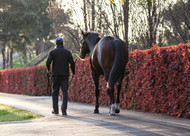Preparing Your Stallion For The Breeding Season
Posted by Scone Equine Hospital on 2nd Apr 2019
We often see articles for mare preparation for the breeding season but what about stallions? Being 50% of the breeding pair, these guys should not be overlooked in preparation for the breeding season! Here are four tips below on having your stallion in tip top shape this breeding season.
Body Condition: Stallions should not be over fat nor should they be underweight. Stallions carrying excess fat may also have increased fat deposits within their scrotum which in turn may insulate the testes, increasing their temperature which may affect semen production and quality. Increasing exercise for these stallions is a good way of ensuring the stallions are fit for the season and not carrying any excess weight. Stallions coming into a breeding season in light condition will likely continue to lose weight throughout the season. A rising plane of nutrition coming into the season is ideal to ensure good body condition throughout the breeding season.
Nutrition: A good ration with a high energy content (similar to a horse in full work) and free choice access to hay should supply the needs for a working stallion. Additional oil may need to be added to the diet to ensure adequate energy content and to prevent weight loss. Energy intake can be increased through the offering of small feeds (< 2kg) 2-4 times daily. There is some evidence to suggest that supplementation of the ration with Omega-3 and Vitamin E may help to improve semen quality. However, feeding for at least 60 days is required before any improvements are identified.
Breeding soundness: It might be a good idea to perform a breeding soundness evaluation on a stallion at the beginning of the breeding season. The benefits of this are many. A breeding soundness evaluation includes a physical examination, an examination of the external reproductive organs, observation of sexual behaviour and a semen evaluation. In addition to assisting in a clean out collection prior to the breeding season, the quality and quantity of the ejaculate can be assessed to determine how many mares the stallion can be expected to serve for the season and whether there are any abnormalities that require further investigation. This is most important for first season sires and stallions that are increasing in age as age related changes may affect serving capacity throughout the season. This breeding soundness evaluation may also include swabs for culture if the stallion is breeding naturally to ensure the stallion has not contracted any transmissible diseases. Furthermore, the breeding soundness evaluation can be incorporated into phantom mare training for the season.
Vaccinations and De-worming: Vaccinations should be given at least 60 days prior to the beginning of the breeding season. An increase in temperature occasionally occurs in response to vaccination and may affect sperm production if prolonged. With this in mind, if your stallion has had any illness, bout of colic or respiratory infection in the 60 days prior to the onset of the breeding season, it would be best to check out his semen production in case there has been any damage in the production during this time, which may affect his fertility. A faecal egg count will determine whether your stallion requires de-worming prior to the breeding season.

